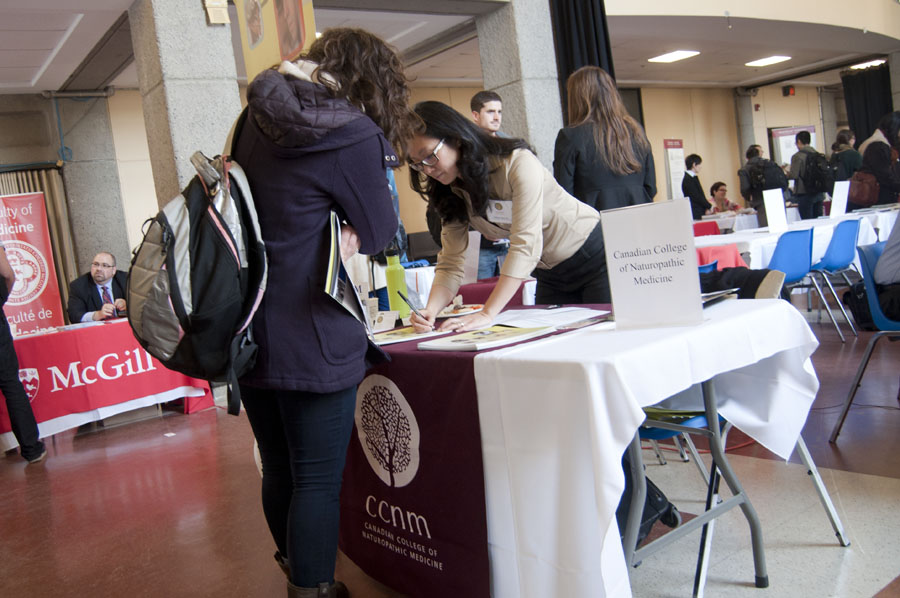Last week, SUS hosted its annual Graduate and Professional Schools Fair. Some students were surprised to see the Canadian College of Naturopathic Medicine and the Ontario College of Homeopathic Medicine listed next to the McGill University Department of Human Genetics and the Massachusetts Institute of Technology Sloan School of Management.
The Canadian College of Naturopathic Medicine offers a four year degree in naturopathic medicine. While the first year is devoted to basic medical sciences, the program continues with courses that include homeopathic medicine (a form of treatment that is made with dilute remedies), hydrotherapy (a range of therapies that involve bathing in hot or cold water), as well as health psychology and clinical nutrition.
While the college bills itself as a program that produces primary care providers—a health professional responsible for diagnosis and treatment—many are skeptical of this claim. Some critics simply accuse naturopaths of quackery, and others point to fact that the wide range of alternative therapies that fall under the banner of naturopathy are inconsistent at best, and dangerous at worst.
Naturopathic medicine deals with not only diet and lifestyle, but also treatments like crystal therapy—a practice using the ‘healing energy’ of stones—and drinking magnetized water. Proponents of naturopathy retort that naturopathic treatments are vindicated by individual results.
The National Institutes of Health released a study last week showing that chelation therapy may make patients slightly less likely to experience adverse heart effects. Chelation therapy, a treatment used to remove heavy metals from the bloodstream, has been recommended for a variety of ailments by some naturopathic doctors.
Many cardiologists cautioned against drawing strong conclusions from the study. Skeptics cited some odd results, such as a two-year time delay before patients showed improvement, and the fact that diabetic patients were inexplicably more likely to benefit from the treatment.
Dr. Joe Schwarcz, director of the McGill Office of Science and Society (OSS), is a critic of naturopathy and homeopathy. Last spring, Dr. Schwarcz debated Dr. André Saine, the dean and main instructor of the Canadian Academy of Homeopathy, on the question of whether naturopathic practitioners should be considered primary care givers in Quebec. The debate—a video of which is available on the OSS website—became extremely heated, as a largely pro-naturopathy audience shouted rebuttals during some of Dr. Schwarcz’s presentation.
Dr. Schwarcz attacked what he deemed a lack of reason in the naturopathic practice. He drew on examples of obvious quackery to illustrate his assertion that a naturopathic education does not distinguish between good and bad medicine. One example was a treatment that involved wearing a magnetic cup to augment breasts.
Dr. Saine presented examples of successful naturopathic treatments, and argued that recognizing naturopathic practitioners as primary care providers would help to regulate the profession and improve Canada’s health care system overall by providing desperately needed primary care providers.
While Dr. Saine proudly defined naturopathic medicine as the combination of modern practices and traditional wisdom, Dr. Shwarcz was adamant that medicine should not be a question of wisdom or anecdote, but rigorous testing and a constantly evolving understanding based on scientific fact.
Dr. Schwarcz and Dr. Saine will meet again at the end of the month to debate homeopathy. The debate will take place Tuesday, Nov. 27 from 7pm-9pm in Leacock 132.









Does anyone at McGill, let alone in science, actually buy into such quackery?